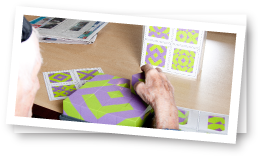Our Blog

January 24, 2013
Just forgetful or is it Dementia?
Everyone becomes forgetful from time to time: forgetting where you placed the car keys, not remembering to pick up an item at the grocery store, forgetting to return a friend’s phone call. And as we age, most of us become increasingly forgetful.
But when does an ordinary memory lapse indicate something more serious, like early Alzheimer’s disease or another form of dementia? Can you brush it off as “just being forgetful,” or might it be mild cognitive impairment, a more pronounced form of memory loss that sometimes precedes dementia?
it is important to pay attention for signs of being forgetful, and to seek medical attention about early signs of dementia and a possible dementia evaluation and work-up.
In order to distinguish the ordinary forgetfulness that comes with aging from more serious problems like Alzheimer’s disease, it helps to consider some key symptoms of mild cognitive impairment and the early stages of dementia.
Repeatedly forgetting names, plans, or something that happened the previous evening, but recalling in detail events that happened in the more distant past, last year, say, or during their childhood, may show signs of early stages of dementia.
In the early stages of dementia one may also have problems with judgment and planning. Someone with early dementia might, for example, become distracted in preparing a recipe or forget the rules of a card game. People with dementia are also much more likely to have traffic accidents than those who do not have dementia. And while many of us are challenged when it comes to finances, someone with early dementia may find it impossible to do everyday chores, like balancing a checkbook, which they used to find easy to do.
As dementia progresses people get even more forgetful. Someone with dementia might get lost in the neighborhood when driving home from the grocery store or forget what day it is. Those with dementia may forget simple words or replace them with strange substitutes, making them difficult to understand. Someone with dementia might also misplace things, like placing a cell phone in the refrigerator, or get confused while getting dressed. These behaviors are not common in someone without dementia.
Unusual changes in personality can also occur, like showing bursts of anger for no reason, becoming depressed or confused, or uncharacteristically clinging to a family member. And while many of us plop down on the couch to watch TV after a long day at work, someone with dementia may show little or no initiative in reaching out to friends and stare at the TV for hours or sleep all day.
If you feel that you or someone in your life is suffering from the early stages of dementia your first step is to talk to a medical professional and arrange to get a full diagnosis. There are different forms of dementia that each requires their own particular treatments so a proper diagnosis is crucial. If you would like more information on dementia please don’t hesitate to contact us.
Read more about Memory Loss and Dementia.






